Council of EPI
Советот на ЕПИ е консултативно тело, во кое членуваат личности од Република Македонија и од странство, кои поради своето знаење и искуството во кои дејствува ЕПИ можат значително да придонесат за остварување на целите на ЕПИ. При именувањето на членовите на Советот, Управниот одбор се раководи од потребата за развивање на културата на дијалог, толеранција и придонес во разгледувањето на различни опции и можности.
Членството во Советот на ЕПИ се извршува без финансиски надомест.
Радмила Шекеринска Јанковска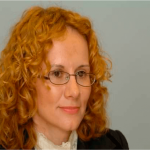 Радмила Шекеринска Јанковска е заменик претседателка на Владата на Република Македонија и министерка за одбрана.
Таа ги претставуваше граѓаните во највисокиот законодавен дом во четири мандати (1998-2002г., 2006-2008г., 2008-2011г. и 2011-2014г.). Раководеше со Националниот совет за евроинтеграции од неговото основање до 2014 година. Од 2002 г. до 2006 г. бешезаменик претседателка на Владата на Република Македонија задолжена за европска интегација и координатор за странска помош. Во тоа својство ја подготви кандидатурата на Република Македонија за членство во Европската унија и го раководеше процесот на внатрешни подготовки за обезбедување на кандидатскиот статус. Во тоа време, Република Македонија го доби статусот на земја кандидат за членство во Европската унија.
Радмила Шекеринска Јанковска е заменик претседателка на Владата на Република Македонија и министерка за одбрана.
Таа ги претставуваше граѓаните во највисокиот законодавен дом во четири мандати (1998-2002г., 2006-2008г., 2008-2011г. и 2011-2014г.). Раководеше со Националниот совет за евроинтеграции од неговото основање до 2014 година. Од 2002 г. до 2006 г. бешезаменик претседателка на Владата на Република Македонија задолжена за европска интегација и координатор за странска помош. Во тоа својство ја подготви кандидатурата на Република Македонија за членство во Европската унија и го раководеше процесот на внатрешни подготовки за обезбедување на кандидатскиот статус. Во тоа време, Република Македонија го доби статусот на земја кандидат за членство во Европската унија.
Антоанета Димитрова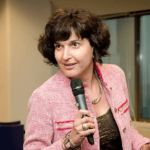 Д-р Антоанета Л. Димитрова е вонредна професорка на Факултетот за владеење и глобални прашања на Универзитетот во Лајден, Холандија. Нејзиниот домен на работа е фокусиран на демократските и државните трансформации на пост-комунистичките земји од Централна и Источна Европа, а особено улогата на Европска Унија во овој процес.
Во последниве години, Антоанета Димитрова е ангажирана во истражувачка соработка во рамките на проектот финансиран од FP7 “Максимизирање на капацитететот за интеграција на Европската Унија: Поуки и перспективи за проширување и следни чекори” (MAXCAP). MAXCAP (www.maxcap-project.eu)ги истражуваше политичките и економските ефекти на проширувањето на ЕУ помеѓу 2004-2007 г., со осврт на стратегиите развиени од ЕУ со цел да се справат со политичките, социјалните и економските предизвици, и лекциите за сегашните и идните проширувања. Од 2016 г., Димитрова е координаторка на проект наEU-STRAT: „Европската Унија и земјите од источното партнерство: Сеопфатна анализа и стратегиска оценка“.
Д-р Антоанета Л. Димитрова е вонредна професорка на Факултетот за владеење и глобални прашања на Универзитетот во Лајден, Холандија. Нејзиниот домен на работа е фокусиран на демократските и државните трансформации на пост-комунистичките земји од Централна и Источна Европа, а особено улогата на Европска Унија во овој процес.
Во последниве години, Антоанета Димитрова е ангажирана во истражувачка соработка во рамките на проектот финансиран од FP7 “Максимизирање на капацитететот за интеграција на Европската Унија: Поуки и перспективи за проширување и следни чекори” (MAXCAP). MAXCAP (www.maxcap-project.eu)ги истражуваше политичките и економските ефекти на проширувањето на ЕУ помеѓу 2004-2007 г., со осврт на стратегиите развиени од ЕУ со цел да се справат со политичките, социјалните и економските предизвици, и лекциите за сегашните и идните проширувања. Од 2016 г., Димитрова е координаторка на проект наEU-STRAT: „Европската Унија и земјите од источното партнерство: Сеопфатна анализа и стратегиска оценка“.
Адам Фаган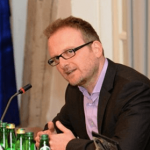 Д-р Адам Фаган е раководител и претседава со „Европските политики“ на Универзитетот Квин Мери во Лондон (Queen Mary University of London), а воедно е професор на Лондонската школа за економија (LSEE – LSE South East Europe Research). Неговото истражувачка кариера се фокусира на европеизација на пост-конфликтните поранешни југословенски држави од Западен Балкан.Интензивно пишува за влијанието на странската донаторска помош за Босна и Херцеговина, за изградба на нови знаења за политики и капацитети во кревките демократии, како и за оценка на обидите на ЕУ за развој на граѓанското општество и добро владеење во Србија и Косово. Од септември 2007 г., Адам е главен истражувач на проект финансиран од AHRC од 209.000 фунти, кој ја испитува европеизацијата на управувањето со животната средина во Босна и Србија наречен „Европска усогласеност на Босна и Херцеговина и Србија (ECoBHAS).Адам е ко-истражувач во истражувачкиот проект MAXCAP (Максимизирање на интегративниот капацитет на Европската унија) финансиран од ЕУ.
Д-р Адам Фаган е раководител и претседава со „Европските политики“ на Универзитетот Квин Мери во Лондон (Queen Mary University of London), а воедно е професор на Лондонската школа за економија (LSEE – LSE South East Europe Research). Неговото истражувачка кариера се фокусира на европеизација на пост-конфликтните поранешни југословенски држави од Западен Балкан.Интензивно пишува за влијанието на странската донаторска помош за Босна и Херцеговина, за изградба на нови знаења за политики и капацитети во кревките демократии, како и за оценка на обидите на ЕУ за развој на граѓанското општество и добро владеење во Србија и Косово. Од септември 2007 г., Адам е главен истражувач на проект финансиран од AHRC од 209.000 фунти, кој ја испитува европеизацијата на управувањето со животната средина во Босна и Србија наречен „Европска усогласеност на Босна и Херцеговина и Србија (ECoBHAS).Адам е ко-истражувач во истражувачкиот проект MAXCAP (Максимизирање на интегративниот капацитет на Европската унија) финансиран од ЕУ.
Фатмир Бесими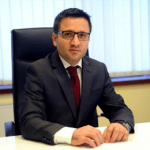 Д-р Фатмр Бесими е поранешен заменик претседател на Владата задолжен за европски прашања во Владата на Република Македонија (2013 – 2016г.). Во 2011г. година беше министер за одбрана во Владата на Република Македонија (прв министер од албанската етничка заедница на оваа позиција) и во тој период и член на Националниот совет за безбедност на Република Македонија. Исто така, тој е поранешен министер за екномија во два мандати во 2004 и во 2008 година. Претходно е ангажиран како економист во канцеларијата на Светска Банка во Косово во 2007 година додека пак во 2003 – 2004 беше избран и за Вицегувернер на Народната банка на Република Македонија.
Д-р Фатмр Бесими е поранешен заменик претседател на Владата задолжен за европски прашања во Владата на Република Македонија (2013 – 2016г.). Во 2011г. година беше министер за одбрана во Владата на Република Македонија (прв министер од албанската етничка заедница на оваа позиција) и во тој период и член на Националниот совет за безбедност на Република Македонија. Исто така, тој е поранешен министер за екномија во два мандати во 2004 и во 2008 година. Претходно е ангажиран како економист во канцеларијата на Светска Банка во Косово во 2007 година додека пак во 2003 – 2004 беше избран и за Вицегувернер на Народната банка на Република Македонија.
Јулиана Николова Јулиана Николова е директорка на Центарот за политики за модернизација, основач на веб-порталот www.europe.bg од 2003г., кој разработува теми од областа на европската интеграција. Таа е поранешен секретар на Координативниот совет за фондовите на ЕУ (2009-2011г.), советник на премиерот за прашања поврзани со ЕУ (2009-2012г.), директор на Фондацијата на Европскиот институт (2002-2009г.), основач на Балканската мрежа на информации (2005г.) и директор на Директоратот за европска интеграција и односи со меѓународните финансиски институции во Советот на министри (2000-2001г.). Работела како секретар на Советот за европска интеграција на премиерот (2000-2001г.) и била член на преговарачкиот тим за пристапување на Бугарија во ЕУ (2000-2001г.).
Г-а Николова беше заменик-министер за индустрија (1999г.), член на тимот за Спогодбата на бугарија за асоцијација со ЕУ (1992-2001г.) и член на тимот пристапување на Бугарија во Светската трговска организација. Таа била и водечки член на тимот за договорите за ЕФТА и ЦЕФТА.
Јулиана Николова е директорка на Центарот за политики за модернизација, основач на веб-порталот www.europe.bg од 2003г., кој разработува теми од областа на европската интеграција. Таа е поранешен секретар на Координативниот совет за фондовите на ЕУ (2009-2011г.), советник на премиерот за прашања поврзани со ЕУ (2009-2012г.), директор на Фондацијата на Европскиот институт (2002-2009г.), основач на Балканската мрежа на информации (2005г.) и директор на Директоратот за европска интеграција и односи со меѓународните финансиски институции во Советот на министри (2000-2001г.). Работела како секретар на Советот за европска интеграција на премиерот (2000-2001г.) и била член на преговарачкиот тим за пристапување на Бугарија во ЕУ (2000-2001г.).
Г-а Николова беше заменик-министер за индустрија (1999г.), член на тимот за Спогодбата на бугарија за асоцијација со ЕУ (1992-2001г.) и член на тимот пристапување на Бугарија во Светската трговска организација. Таа била и водечки член на тимот за договорите за ЕФТА и ЦЕФТА.
Тобиас Флесенкемпер Тобијас Флесенкепер е управен директор и основач на советодавната организација Elbarlament базирана во Берлин која се фокусира на иновациите во демократското владеење и безбедноста. Тој е исто така висок член на Меѓународниот центар за образование на Европа (CIFE) во Ница и предавач по европска политика на Универзитетот во Келн. Во 2012 и 2013 г. бил надворешен истражувач во германскиот Институт за меѓународни и безбедносни работи (SWP) во Берлин. Од 2004 до 2012 г. работел во операции за Заедничка безбедносна и одбранбена политика на ЕУ во политички и управувачки функции во регионот на Западен Балкан и во Брисел. Пред тоа работел како советник на Организацијата за безбедност и соработка во Европа (ОБСЕ), УНИЦЕФ, ЕУ и Берлинскиот Центар за меѓународни операции за мир (ЗИФ).
Тобијас Флесенкепер, е соработник на програмата во ЕКДПМ од 2017 г. Тој работи со ЕКДПМ од 2015 г. на студија за системот на специјалниот претставник на Европската унија (ЕУСР) и за проектот ЦИВИЛЕКС, за кој тој обезбедува експертиза за Заедничката политика за безбедност и одбрана.
Тобијас Флесенкепер е управен директор и основач на советодавната организација Elbarlament базирана во Берлин која се фокусира на иновациите во демократското владеење и безбедноста. Тој е исто така висок член на Меѓународниот центар за образование на Европа (CIFE) во Ница и предавач по европска политика на Универзитетот во Келн. Во 2012 и 2013 г. бил надворешен истражувач во германскиот Институт за меѓународни и безбедносни работи (SWP) во Берлин. Од 2004 до 2012 г. работел во операции за Заедничка безбедносна и одбранбена политика на ЕУ во политички и управувачки функции во регионот на Западен Балкан и во Брисел. Пред тоа работел како советник на Организацијата за безбедност и соработка во Европа (ОБСЕ), УНИЦЕФ, ЕУ и Берлинскиот Центар за меѓународни операции за мир (ЗИФ).
Тобијас Флесенкепер, е соработник на програмата во ЕКДПМ од 2017 г. Тој работи со ЕКДПМ од 2015 г. на студија за системот на специјалниот претставник на Европската унија (ЕУСР) и за проектот ЦИВИЛЕКС, за кој тој обезбедува експертиза за Заедничката политика за безбедност и одбрана.
Димитар Белчев Димитар Белчев е поранешен дипломат. Во 1972 г. стапил на работа во Македонски железници каде се занимавал со планирање, проектирање и изградба на постројки на електрична влеча на возови. Од 1982 г. е на работа во Генералекспорт Белград, прво како технички и комерцијален претставник на странски фирми (Сименс од Германија, ДАФ од Холандија и други), а потоа како директор на Претставништвото во Скопје.
Во 1992 бил именуван за потсекретар за економски прашања во Министертвото за односи со странство работи на Македонија (подоцна преименувано во Министерство за надворешни работи). Учествувал во преговорите за пристапување на Република Македонија во специјализираните агенции на Обединетите нации и во преговорите за склучување на Спогодбата за стабилизација и асоцијација со Европските заедници и нивните земји членки. Бил на служба во Постојаната мисија на Република Македонија при Обединетите нации во Женева (1995-1997г.) и во Мисијата на Република Македонија при Европската Унија (2001-2005г.). Активната служба во Министерството за надворешни работи ја завршил во 2010 г. како Национален координатор за регионална соработка.
Димитар Белчев е поранешен дипломат. Во 1972 г. стапил на работа во Македонски железници каде се занимавал со планирање, проектирање и изградба на постројки на електрична влеча на возови. Од 1982 г. е на работа во Генералекспорт Белград, прво како технички и комерцијален претставник на странски фирми (Сименс од Германија, ДАФ од Холандија и други), а потоа како директор на Претставништвото во Скопје.
Во 1992 бил именуван за потсекретар за економски прашања во Министертвото за односи со странство работи на Македонија (подоцна преименувано во Министерство за надворешни работи). Учествувал во преговорите за пристапување на Република Македонија во специјализираните агенции на Обединетите нации и во преговорите за склучување на Спогодбата за стабилизација и асоцијација со Европските заедници и нивните земји членки. Бил на служба во Постојаната мисија на Република Македонија при Обединетите нации во Женева (1995-1997г.) и во Мисијата на Република Македонија при Европската Унија (2001-2005г.). Активната служба во Министерството за надворешни работи ја завршил во 2010 г. како Национален координатор за регионална соработка.
Сашо Клековски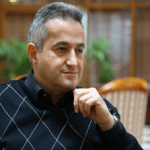 Сашо Клековски е незавизен консултант. Неговото искуство е дваесетгодишна работа на раководни позиции во граѓанскиот сектор и пет години консултантско искуство. На крајот на осумдесеттите и почетокот на деведесеттите ги води Сојузот на студентите по медицина на Македонија и Сојузот на студентите на Универзитетот „Св. Кирил и Методиј“. Во 1993 г. е еден од основачите, а од 1994 г. е извршен директор на Македонскиот центар за меѓународна соработка. Од 1998 до 2008 година е застапник на Македонската развојна фондација за претпријатија.
Клековски бил член на повеќе комитети и одбори во Македонија и во странство, вклучувајќи и во Управниот одбор на Транспарентност Македонија. Тој е прв ко-претседател на Заедничкиот консултативен комитет на граѓанското општество меѓу Европската Унија и Република Македонија за периодот 2009-2010г. Потпретседател е на Деловниот совет на Универзитетот Американ колеџ – Скопје (УАЦС). Предавач на МБА програмата на Факултет за бизнис администрација на УАЦС од 2014 г. Има длабоки разбирања и знаења за граѓанското општество во Македонија. Искуство на Балканот (Албанија, Косово, Романија), како и во Кавказ (Грузија), Централна Азија (Казахстан, Киргистан).
Сашо Клековски е незавизен консултант. Неговото искуство е дваесетгодишна работа на раководни позиции во граѓанскиот сектор и пет години консултантско искуство. На крајот на осумдесеттите и почетокот на деведесеттите ги води Сојузот на студентите по медицина на Македонија и Сојузот на студентите на Универзитетот „Св. Кирил и Методиј“. Во 1993 г. е еден од основачите, а од 1994 г. е извршен директор на Македонскиот центар за меѓународна соработка. Од 1998 до 2008 година е застапник на Македонската развојна фондација за претпријатија.
Клековски бил член на повеќе комитети и одбори во Македонија и во странство, вклучувајќи и во Управниот одбор на Транспарентност Македонија. Тој е прв ко-претседател на Заедничкиот консултативен комитет на граѓанското општество меѓу Европската Унија и Република Македонија за периодот 2009-2010г. Потпретседател е на Деловниот совет на Универзитетот Американ колеџ – Скопје (УАЦС). Предавач на МБА програмата на Факултет за бизнис администрација на УАЦС од 2014 г. Има длабоки разбирања и знаења за граѓанското општество во Македонија. Искуство на Балканот (Албанија, Косово, Романија), како и во Кавказ (Грузија), Централна Азија (Казахстан, Киргистан).
Милада Вачудова Милада Ана Вачудова е вонреден професор по политички науки, раководител на Жан Моне за ЕУ студии и раководител на курикулумот за глобални студии на Универзитетот на Северна Каролина во Чапел Хил. Др. Вачудова има објавувано многу за демократизацијата и политичката промена во посткомунистичка Европа, за проширувањето на Европската Унија и за влијанието на меѓународните актери во домашната политика. Нејзината книга, Европа неразделена: демократија, влијание и интеграција по комунизмот, е наградена со 12-тата Штајн Рокајн награда за компаративно истражување во општествените науки.
Професорката Вачудова во моментов работи на политичката промена и меѓународната инволвираност во Западниот Балкан. Таа била стипендист на повеќе институции, меѓу кои и Европскиот универзитетски институт во Фиренца, Италија, Центарот за европски студии на Универзитетот Харвард, Центарот за меѓународни студии на Унверзитетот Принцетон, Белфер центарот за наука и меѓународни односи на Универзитетот Харвард и Националната фондација за наука. Таа дипломирала на Универзитетот во Стенфорд. Таа докторирала на Факултетот за политика на Универзитетот во Оксфорд.
Милада Ана Вачудова е вонреден професор по политички науки, раководител на Жан Моне за ЕУ студии и раководител на курикулумот за глобални студии на Универзитетот на Северна Каролина во Чапел Хил. Др. Вачудова има објавувано многу за демократизацијата и политичката промена во посткомунистичка Европа, за проширувањето на Европската Унија и за влијанието на меѓународните актери во домашната политика. Нејзината книга, Европа неразделена: демократија, влијание и интеграција по комунизмот, е наградена со 12-тата Штајн Рокајн награда за компаративно истражување во општествените науки.
Професорката Вачудова во моментов работи на политичката промена и меѓународната инволвираност во Западниот Балкан. Таа била стипендист на повеќе институции, меѓу кои и Европскиот универзитетски институт во Фиренца, Италија, Центарот за европски студии на Универзитетот Харвард, Центарот за меѓународни студии на Унверзитетот Принцетон, Белфер центарот за наука и меѓународни односи на Универзитетот Харвард и Националната фондација за наука. Таа дипломирала на Универзитетот во Стенфорд. Таа докторирала на Факултетот за политика на Универзитетот во Оксфорд.
Каудијус Маниокас Клаудиус Маниокас докторирал во областа на општествените науки на Универзитетот во Вилнус. Тој поминал повеќе од 10 години во јавниот сектор, работејќи на пристапувањето на Литванија во Европската Унија. Во моментов, тој е претседател на Одборот на консултатската фирма Европски социјални, правни и економски проекти (ЕСТЕП) со седиште во Вилнус. Од 2004 година, тој ја водел ЕСТЕП во повеќе консултантски задачи, со фокус на инвестициите во јавниот сектор, нивната ефикасност и општи прашања поврзани со ЕУ. Тој бил консултант на владите од Источното партнерство и Западен Балкан за европски прашања во последните десет години.
Клаудиус Маниокас докторирал во областа на општествените науки на Универзитетот во Вилнус. Тој поминал повеќе од 10 години во јавниот сектор, работејќи на пристапувањето на Литванија во Европската Унија. Во моментов, тој е претседател на Одборот на консултатската фирма Европски социјални, правни и економски проекти (ЕСТЕП) со седиште во Вилнус. Од 2004 година, тој ја водел ЕСТЕП во повеќе консултантски задачи, со фокус на инвестициите во јавниот сектор, нивната ефикасност и општи прашања поврзани со ЕУ. Тој бил консултант на владите од Источното партнерство и Западен Балкан за европски прашања во последните десет години.
Радмила Шекеринска Јанковска
 Радмила Шекеринска Јанковска е заменик претседателка на Владата на Република Македонија и министерка за одбрана.
Таа ги претставуваше граѓаните во највисокиот законодавен дом во четири мандати (1998-2002г., 2006-2008г., 2008-2011г. и 2011-2014г.). Раководеше со Националниот совет за евроинтеграции од неговото основање до 2014 година. Од 2002 г. до 2006 г. бешезаменик претседателка на Владата на Република Македонија задолжена за европска интегација и координатор за странска помош. Во тоа својство ја подготви кандидатурата на Република Македонија за членство во Европската унија и го раководеше процесот на внатрешни подготовки за обезбедување на кандидатскиот статус. Во тоа време, Република Македонија го доби статусот на земја кандидат за членство во Европската унија.
Радмила Шекеринска Јанковска е заменик претседателка на Владата на Република Македонија и министерка за одбрана.
Таа ги претставуваше граѓаните во највисокиот законодавен дом во четири мандати (1998-2002г., 2006-2008г., 2008-2011г. и 2011-2014г.). Раководеше со Националниот совет за евроинтеграции од неговото основање до 2014 година. Од 2002 г. до 2006 г. бешезаменик претседателка на Владата на Република Македонија задолжена за европска интегација и координатор за странска помош. Во тоа својство ја подготви кандидатурата на Република Македонија за членство во Европската унија и го раководеше процесот на внатрешни подготовки за обезбедување на кандидатскиот статус. Во тоа време, Република Македонија го доби статусот на земја кандидат за членство во Европската унија.
Антоанета Димитрова
 Д-р Антоанета Л. Димитрова е вонредна професорка на Факултетот за владеење и глобални прашања на Универзитетот во Лајден, Холандија. Нејзиниот домен на работа е фокусиран на демократските и државните трансформации на пост-комунистичките земји од Централна и Источна Европа, а особено улогата на Европска Унија во овој процес.
Во последниве години, Антоанета Димитрова е ангажирана во истражувачка соработка во рамките на проектот финансиран од FP7 “Максимизирање на капацитететот за интеграција на Европската Унија: Поуки и перспективи за проширување и следни чекори” (MAXCAP). MAXCAP (www.maxcap-project.eu)ги истражуваше политичките и економските ефекти на проширувањето на ЕУ помеѓу 2004-2007 г., со осврт на стратегиите развиени од ЕУ со цел да се справат со политичките, социјалните и економските предизвици, и лекциите за сегашните и идните проширувања. Од 2016 г., Димитрова е координаторка на проект наEU-STRAT: „Европската Унија и земјите од источното партнерство: Сеопфатна анализа и стратегиска оценка“.
Д-р Антоанета Л. Димитрова е вонредна професорка на Факултетот за владеење и глобални прашања на Универзитетот во Лајден, Холандија. Нејзиниот домен на работа е фокусиран на демократските и државните трансформации на пост-комунистичките земји од Централна и Источна Европа, а особено улогата на Европска Унија во овој процес.
Во последниве години, Антоанета Димитрова е ангажирана во истражувачка соработка во рамките на проектот финансиран од FP7 “Максимизирање на капацитететот за интеграција на Европската Унија: Поуки и перспективи за проширување и следни чекори” (MAXCAP). MAXCAP (www.maxcap-project.eu)ги истражуваше политичките и економските ефекти на проширувањето на ЕУ помеѓу 2004-2007 г., со осврт на стратегиите развиени од ЕУ со цел да се справат со политичките, социјалните и економските предизвици, и лекциите за сегашните и идните проширувања. Од 2016 г., Димитрова е координаторка на проект наEU-STRAT: „Европската Унија и земјите од источното партнерство: Сеопфатна анализа и стратегиска оценка“.
Адам Фаган
 Д-р Адам Фаган е раководител и претседава со „Европските политики“ на Универзитетот Квин Мери во Лондон (Queen Mary University of London), а воедно е професор на Лондонската школа за економија (LSEE – LSE South East Europe Research). Неговото истражувачка кариера се фокусира на европеизација на пост-конфликтните поранешни југословенски држави од Западен Балкан.Интензивно пишува за влијанието на странската донаторска помош за Босна и Херцеговина, за изградба на нови знаења за политики и капацитети во кревките демократии, како и за оценка на обидите на ЕУ за развој на граѓанското општество и добро владеење во Србија и Косово. Од септември 2007 г., Адам е главен истражувач на проект финансиран од AHRC од 209.000 фунти, кој ја испитува европеизацијата на управувањето со животната средина во Босна и Србија наречен „Европска усогласеност на Босна и Херцеговина и Србија (ECoBHAS).Адам е ко-истражувач во истражувачкиот проект MAXCAP (Максимизирање на интегративниот капацитет на Европската унија) финансиран од ЕУ.
Д-р Адам Фаган е раководител и претседава со „Европските политики“ на Универзитетот Квин Мери во Лондон (Queen Mary University of London), а воедно е професор на Лондонската школа за економија (LSEE – LSE South East Europe Research). Неговото истражувачка кариера се фокусира на европеизација на пост-конфликтните поранешни југословенски држави од Западен Балкан.Интензивно пишува за влијанието на странската донаторска помош за Босна и Херцеговина, за изградба на нови знаења за политики и капацитети во кревките демократии, како и за оценка на обидите на ЕУ за развој на граѓанското општество и добро владеење во Србија и Косово. Од септември 2007 г., Адам е главен истражувач на проект финансиран од AHRC од 209.000 фунти, кој ја испитува европеизацијата на управувањето со животната средина во Босна и Србија наречен „Европска усогласеност на Босна и Херцеговина и Србија (ECoBHAS).Адам е ко-истражувач во истражувачкиот проект MAXCAP (Максимизирање на интегративниот капацитет на Европската унија) финансиран од ЕУ.
Фатмир Бесими
 Д-р Фатмр Бесими е поранешен заменик претседател на Владата задолжен за европски прашања во Владата на Република Македонија (2013 – 2016г.). Во 2011г. година беше министер за одбрана во Владата на Република Македонија (прв министер од албанската етничка заедница на оваа позиција) и во тој период и член на Националниот совет за безбедност на Република Македонија. Исто така, тој е поранешен министер за екномија во два мандати во 2004 и во 2008 година. Претходно е ангажиран како економист во канцеларијата на Светска Банка во Косово во 2007 година додека пак во 2003 – 2004 беше избран и за Вицегувернер на Народната банка на Република Македонија.
Д-р Фатмр Бесими е поранешен заменик претседател на Владата задолжен за европски прашања во Владата на Република Македонија (2013 – 2016г.). Во 2011г. година беше министер за одбрана во Владата на Република Македонија (прв министер од албанската етничка заедница на оваа позиција) и во тој период и член на Националниот совет за безбедност на Република Македонија. Исто така, тој е поранешен министер за екномија во два мандати во 2004 и во 2008 година. Претходно е ангажиран како економист во канцеларијата на Светска Банка во Косово во 2007 година додека пак во 2003 – 2004 беше избран и за Вицегувернер на Народната банка на Република Македонија.
Јулиана Николова
 Јулиана Николова е директорка на Центарот за политики за модернизација, основач на веб-порталот www.europe.bg од 2003г., кој разработува теми од областа на европската интеграција. Таа е поранешен секретар на Координативниот совет за фондовите на ЕУ (2009-2011г.), советник на премиерот за прашања поврзани со ЕУ (2009-2012г.), директор на Фондацијата на Европскиот институт (2002-2009г.), основач на Балканската мрежа на информации (2005г.) и директор на Директоратот за европска интеграција и односи со меѓународните финансиски институции во Советот на министри (2000-2001г.). Работела како секретар на Советот за европска интеграција на премиерот (2000-2001г.) и била член на преговарачкиот тим за пристапување на Бугарија во ЕУ (2000-2001г.).
Г-а Николова беше заменик-министер за индустрија (1999г.), член на тимот за Спогодбата на бугарија за асоцијација со ЕУ (1992-2001г.) и член на тимот пристапување на Бугарија во Светската трговска организација. Таа била и водечки член на тимот за договорите за ЕФТА и ЦЕФТА.
Јулиана Николова е директорка на Центарот за политики за модернизација, основач на веб-порталот www.europe.bg од 2003г., кој разработува теми од областа на европската интеграција. Таа е поранешен секретар на Координативниот совет за фондовите на ЕУ (2009-2011г.), советник на премиерот за прашања поврзани со ЕУ (2009-2012г.), директор на Фондацијата на Европскиот институт (2002-2009г.), основач на Балканската мрежа на информации (2005г.) и директор на Директоратот за европска интеграција и односи со меѓународните финансиски институции во Советот на министри (2000-2001г.). Работела како секретар на Советот за европска интеграција на премиерот (2000-2001г.) и била член на преговарачкиот тим за пристапување на Бугарија во ЕУ (2000-2001г.).
Г-а Николова беше заменик-министер за индустрија (1999г.), член на тимот за Спогодбата на бугарија за асоцијација со ЕУ (1992-2001г.) и член на тимот пристапување на Бугарија во Светската трговска организација. Таа била и водечки член на тимот за договорите за ЕФТА и ЦЕФТА.
Тобиас Флесенкемпер
 Тобијас Флесенкепер е управен директор и основач на советодавната организација Elbarlament базирана во Берлин која се фокусира на иновациите во демократското владеење и безбедноста. Тој е исто така висок член на Меѓународниот центар за образование на Европа (CIFE) во Ница и предавач по европска политика на Универзитетот во Келн. Во 2012 и 2013 г. бил надворешен истражувач во германскиот Институт за меѓународни и безбедносни работи (SWP) во Берлин. Од 2004 до 2012 г. работел во операции за Заедничка безбедносна и одбранбена политика на ЕУ во политички и управувачки функции во регионот на Западен Балкан и во Брисел. Пред тоа работел како советник на Организацијата за безбедност и соработка во Европа (ОБСЕ), УНИЦЕФ, ЕУ и Берлинскиот Центар за меѓународни операции за мир (ЗИФ).
Тобијас Флесенкепер, е соработник на програмата во ЕКДПМ од 2017 г. Тој работи со ЕКДПМ од 2015 г. на студија за системот на специјалниот претставник на Европската унија (ЕУСР) и за проектот ЦИВИЛЕКС, за кој тој обезбедува експертиза за Заедничката политика за безбедност и одбрана.
Тобијас Флесенкепер е управен директор и основач на советодавната организација Elbarlament базирана во Берлин која се фокусира на иновациите во демократското владеење и безбедноста. Тој е исто така висок член на Меѓународниот центар за образование на Европа (CIFE) во Ница и предавач по европска политика на Универзитетот во Келн. Во 2012 и 2013 г. бил надворешен истражувач во германскиот Институт за меѓународни и безбедносни работи (SWP) во Берлин. Од 2004 до 2012 г. работел во операции за Заедничка безбедносна и одбранбена политика на ЕУ во политички и управувачки функции во регионот на Западен Балкан и во Брисел. Пред тоа работел како советник на Организацијата за безбедност и соработка во Европа (ОБСЕ), УНИЦЕФ, ЕУ и Берлинскиот Центар за меѓународни операции за мир (ЗИФ).
Тобијас Флесенкепер, е соработник на програмата во ЕКДПМ од 2017 г. Тој работи со ЕКДПМ од 2015 г. на студија за системот на специјалниот претставник на Европската унија (ЕУСР) и за проектот ЦИВИЛЕКС, за кој тој обезбедува експертиза за Заедничката политика за безбедност и одбрана.
Димитар Белчев
 Димитар Белчев е поранешен дипломат. Во 1972 г. стапил на работа во Македонски железници каде се занимавал со планирање, проектирање и изградба на постројки на електрична влеча на возови. Од 1982 г. е на работа во Генералекспорт Белград, прво како технички и комерцијален претставник на странски фирми (Сименс од Германија, ДАФ од Холандија и други), а потоа како директор на Претставништвото во Скопје.
Во 1992 бил именуван за потсекретар за економски прашања во Министертвото за односи со странство работи на Македонија (подоцна преименувано во Министерство за надворешни работи). Учествувал во преговорите за пристапување на Република Македонија во специјализираните агенции на Обединетите нации и во преговорите за склучување на Спогодбата за стабилизација и асоцијација со Европските заедници и нивните земји членки. Бил на служба во Постојаната мисија на Република Македонија при Обединетите нации во Женева (1995-1997г.) и во Мисијата на Република Македонија при Европската Унија (2001-2005г.). Активната служба во Министерството за надворешни работи ја завршил во 2010 г. како Национален координатор за регионална соработка.
Димитар Белчев е поранешен дипломат. Во 1972 г. стапил на работа во Македонски железници каде се занимавал со планирање, проектирање и изградба на постројки на електрична влеча на возови. Од 1982 г. е на работа во Генералекспорт Белград, прво како технички и комерцијален претставник на странски фирми (Сименс од Германија, ДАФ од Холандија и други), а потоа како директор на Претставништвото во Скопје.
Во 1992 бил именуван за потсекретар за економски прашања во Министертвото за односи со странство работи на Македонија (подоцна преименувано во Министерство за надворешни работи). Учествувал во преговорите за пристапување на Република Македонија во специјализираните агенции на Обединетите нации и во преговорите за склучување на Спогодбата за стабилизација и асоцијација со Европските заедници и нивните земји членки. Бил на служба во Постојаната мисија на Република Македонија при Обединетите нации во Женева (1995-1997г.) и во Мисијата на Република Македонија при Европската Унија (2001-2005г.). Активната служба во Министерството за надворешни работи ја завршил во 2010 г. како Национален координатор за регионална соработка.
Сашо Клековски
 Сашо Клековски е незавизен консултант. Неговото искуство е дваесетгодишна работа на раководни позиции во граѓанскиот сектор и пет години консултантско искуство. На крајот на осумдесеттите и почетокот на деведесеттите ги води Сојузот на студентите по медицина на Македонија и Сојузот на студентите на Универзитетот „Св. Кирил и Методиј“. Во 1993 г. е еден од основачите, а од 1994 г. е извршен директор на Македонскиот центар за меѓународна соработка. Од 1998 до 2008 година е застапник на Македонската развојна фондација за претпријатија.
Клековски бил член на повеќе комитети и одбори во Македонија и во странство, вклучувајќи и во Управниот одбор на Транспарентност Македонија. Тој е прв ко-претседател на Заедничкиот консултативен комитет на граѓанското општество меѓу Европската Унија и Република Македонија за периодот 2009-2010г. Потпретседател е на Деловниот совет на Универзитетот Американ колеџ – Скопје (УАЦС). Предавач на МБА програмата на Факултет за бизнис администрација на УАЦС од 2014 г. Има длабоки разбирања и знаења за граѓанското општество во Македонија. Искуство на Балканот (Албанија, Косово, Романија), како и во Кавказ (Грузија), Централна Азија (Казахстан, Киргистан).
Сашо Клековски е незавизен консултант. Неговото искуство е дваесетгодишна работа на раководни позиции во граѓанскиот сектор и пет години консултантско искуство. На крајот на осумдесеттите и почетокот на деведесеттите ги води Сојузот на студентите по медицина на Македонија и Сојузот на студентите на Универзитетот „Св. Кирил и Методиј“. Во 1993 г. е еден од основачите, а од 1994 г. е извршен директор на Македонскиот центар за меѓународна соработка. Од 1998 до 2008 година е застапник на Македонската развојна фондација за претпријатија.
Клековски бил член на повеќе комитети и одбори во Македонија и во странство, вклучувајќи и во Управниот одбор на Транспарентност Македонија. Тој е прв ко-претседател на Заедничкиот консултативен комитет на граѓанското општество меѓу Европската Унија и Република Македонија за периодот 2009-2010г. Потпретседател е на Деловниот совет на Универзитетот Американ колеџ – Скопје (УАЦС). Предавач на МБА програмата на Факултет за бизнис администрација на УАЦС од 2014 г. Има длабоки разбирања и знаења за граѓанското општество во Македонија. Искуство на Балканот (Албанија, Косово, Романија), како и во Кавказ (Грузија), Централна Азија (Казахстан, Киргистан).
Милада Вачудова
 Милада Ана Вачудова е вонреден професор по политички науки, раководител на Жан Моне за ЕУ студии и раководител на курикулумот за глобални студии на Универзитетот на Северна Каролина во Чапел Хил. Др. Вачудова има објавувано многу за демократизацијата и политичката промена во посткомунистичка Европа, за проширувањето на Европската Унија и за влијанието на меѓународните актери во домашната политика. Нејзината книга, Европа неразделена: демократија, влијание и интеграција по комунизмот, е наградена со 12-тата Штајн Рокајн награда за компаративно истражување во општествените науки.
Професорката Вачудова во моментов работи на политичката промена и меѓународната инволвираност во Западниот Балкан. Таа била стипендист на повеќе институции, меѓу кои и Европскиот универзитетски институт во Фиренца, Италија, Центарот за европски студии на Универзитетот Харвард, Центарот за меѓународни студии на Унверзитетот Принцетон, Белфер центарот за наука и меѓународни односи на Универзитетот Харвард и Националната фондација за наука. Таа дипломирала на Универзитетот во Стенфорд. Таа докторирала на Факултетот за политика на Универзитетот во Оксфорд.
Милада Ана Вачудова е вонреден професор по политички науки, раководител на Жан Моне за ЕУ студии и раководител на курикулумот за глобални студии на Универзитетот на Северна Каролина во Чапел Хил. Др. Вачудова има објавувано многу за демократизацијата и политичката промена во посткомунистичка Европа, за проширувањето на Европската Унија и за влијанието на меѓународните актери во домашната политика. Нејзината книга, Европа неразделена: демократија, влијание и интеграција по комунизмот, е наградена со 12-тата Штајн Рокајн награда за компаративно истражување во општествените науки.
Професорката Вачудова во моментов работи на политичката промена и меѓународната инволвираност во Западниот Балкан. Таа била стипендист на повеќе институции, меѓу кои и Европскиот универзитетски институт во Фиренца, Италија, Центарот за европски студии на Универзитетот Харвард, Центарот за меѓународни студии на Унверзитетот Принцетон, Белфер центарот за наука и меѓународни односи на Универзитетот Харвард и Националната фондација за наука. Таа дипломирала на Универзитетот во Стенфорд. Таа докторирала на Факултетот за политика на Универзитетот во Оксфорд.
Каудијус Маниокас
 Клаудиус Маниокас докторирал во областа на општествените науки на Универзитетот во Вилнус. Тој поминал повеќе од 10 години во јавниот сектор, работејќи на пристапувањето на Литванија во Европската Унија. Во моментов, тој е претседател на Одборот на консултатската фирма Европски социјални, правни и економски проекти (ЕСТЕП) со седиште во Вилнус. Од 2004 година, тој ја водел ЕСТЕП во повеќе консултантски задачи, со фокус на инвестициите во јавниот сектор, нивната ефикасност и општи прашања поврзани со ЕУ. Тој бил консултант на владите од Источното партнерство и Западен Балкан за европски прашања во последните десет години.
Клаудиус Маниокас докторирал во областа на општествените науки на Универзитетот во Вилнус. Тој поминал повеќе од 10 години во јавниот сектор, работејќи на пристапувањето на Литванија во Европската Унија. Во моментов, тој е претседател на Одборот на консултатската фирма Европски социјални, правни и економски проекти (ЕСТЕП) со седиште во Вилнус. Од 2004 година, тој ја водел ЕСТЕП во повеќе консултантски задачи, со фокус на инвестициите во јавниот сектор, нивната ефикасност и општи прашања поврзани со ЕУ. Тој бил консултант на владите од Источното партнерство и Западен Балкан за европски прашања во последните десет години.
